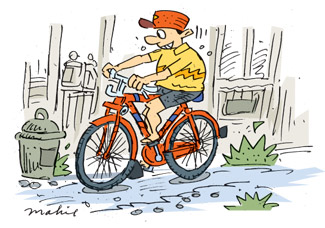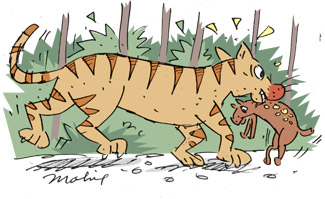|

by R. S. Karunaratne
Differences between similar verbs
Some verbs in English may appear to be similar in meaning but they
have different meanings. Let's have a look at some of these verbs.
1. Flaunt and flout
|

The boy pedalled the bicycle
along the narrow street. |
Flaunt means 'to show off.'
Marina loves to flaunt her new sari in front of her friends.
Flout means 'to disobey openly.'
Some high school boys were expelled for flouting the rules.
2. Flounder and founder
Flounder means 'to move with difficulty.' The old men and women
floundered along the slippery road.
Founder means 'to fill with water and sink.'
The boat foundered in a heavy storm.
3. Gamble and gambol
Gamble means 'to play games of chance.' Perera used to gamble all
night at the casino.
Gambol means 'to skip about.' Calves used to gambol in the valley.
4. Imply and infer
Imply means 'to suggest.'
The station master did not say that the train was late but he implied
it.
Infer means 'to deduce.'
From what the chairman said workers inferred that they would not get
any more bonuses.
5. Indict and indite.
Indict means 'to charge.'
Marusira was indited on a charge of murder.
Indite means 'to write down'.
The sergeant inditied the names of the suspects in a register.
6. Liquidate and liquidize
Liquidate means 'to settle or pay.' The businessman agreed to
liquidate his company.
Liquidize means 'to make liquid.' We usually liquidize vegetables to
make a soup.
7. Pedal and Peddle. Pedal means 'to operate a pedal.'
The boy pedalled the bicycle along the narrow street.
Peddle means 'to sell small articles from house to house.'
The man was peddling pencils, erasers and exercise books at the
school gate.
8. Perpetrate and perpetuate
|

Tigers prey on innocent
deer. |
Perpetrate means 'to commit a crime.' Many crimes are perpetrated by
men under the influence of liquor.
Perpetuate means 'to cause something to continue.'
Ben's behaviour will perpetuate his reputation as a bully.
9. Pore and pour.
Pore means 'to study intently.' The student pored over the New Law
Reports.
Pour means 'to cause to flow.'
Water poured from the damaged pipe.
10. Pray and prey.
Pray means 'to speak to God.'
Christians pray and sing hymns in church on Sundays.
Prey means 'to hunt and kill.'
Tigers prey on innocent deer.
11. Precede and proceed
Precede means 'to go in front of.'
The novel is preceded by an introduction.
Proceed means 'to go on.'
The work is proceeding satisfactorily.
12. Raise and raze.
Raise means 'to move to a higher position.'
We raised the national flag.
Raze means 'to destroy completely.'
The army razed the terrorist hideout.
13. Wet and whet.
Wet means 'to cover with moisture.'
You have to wet the mixture of sand and cement before using it.
Whet means 'to sharpen.'
The soldier began to whet the blade of the sword.
Know your idioms
Idioms are colourful and fascinating expressions found in English.
They are used both in formal and informal English. Here is a quiz to
test your knowledge of idioms. Check your answers with the key.
1. The student wrote something and put it on the board as an aide-memoire.
(a) writing that helps him to remember something.
(b) writing that helps him to forget something.
(c) writing that helps him to go to the library.
2. When the professor told me I was getting a first class in my
examination, I was walking on air.
(a) very sad
(b) very happy and excited
(c) upset
3. I may go to the UK for higher studies, but it is still up in the
air.
(a) when the time comes.
(b) depends on my financial situation.
(c) no firm decision has been made.
4. It's no good putting on airs and graces with me because I know
where you work!
(a) trying to impress others.
(b) feeling humble
(c) thinking big
5. Manel is talking about getting married to a prince and living in a
palace. It sounds a bit airy-fairy to me.
(a) arrogant
(b) foolish
(c) not practical
6. When we were in Singapore we walked into a shop that was a real
Aladdin's cave.
(a) place where you do not get anything interesting
(b) place where you get many valuable objects
(c) haunted place
7. Bell bottom trousers were a la mode in the 1960s.
(a) fashionable
(b) out of stock
(c) cheap
8. Alarm bells started to ring when I found that I could not speak.
(a) I was happy
(b) I became worried
(c) I was jubilant
9. The army was put on red alert when a group of terrorists entered
the city.
(a) demobilised
(b) confined to barracks
(c) prepared to act immediately
10. We ate al fresco under a tamarind tree.
(a) heartily
(b) outside
(c) a little
********
[Key]: 1. (a), 2. (b), 3. (c), 4. (a), 5. (c), 6. (b), 7. (a), 8.
(b), 9. (c), 10. (b).
********
Starters :
Present perfect tense
The present perfect tense is formed with 'have/has + past
participle'.
I have broken my leg.
You have failed the examination.
She has left the office keys.
They have started writing.
The dog has begun to wag its tail.
We have made all the arrangements.
The present perfect tense is used to say that a finished action or
event is connected with the present in some way. When we say that
something has happened, we are thinking of the past and the present at
the same time.
I cannot attend your birthday party because I have broken my leg.
Have you read the Mahavamsa?
Somebody has stolen my pen.
The NATO (North Atlantic Treaty Organisation) has invaded Libya.
My pet cat has died.
The student said, "You have taught me nothing."
The present perfect tense is used to express the idea of completion.
They have built a house.
He has finished writing.
The elephant has run away.
The monkey has disappeared.
She has done the painting.
We use the present perfect tense to announce news of recent events.
We have won the war.
Chintha has bagged the first prize.
My friend has crashed his car again.
The pound has fallen against the dollar.
There has been a fire in the factory.
We use the present perfect tense with some time words.
Have you ever climbed Mt Everest?
She has never seen a ghost.
I haven't seen Soma recently.
He has already cleaned the room.
She has never said 'sorry' in her life.
Has the postman come yet?
Have you done sales before?
I haven't heard from him
lately.
We use the present perfect tense to indicate that something has
happened several times up to the present.
I have received nine calls from him since breakfast.
We use the present perfect tense with adverbs of
frequency.
I have often warned him against smoking.
She has sometimes considered leaving her job.
We have occasionally made silly mistakes.
Guessing game
Match each word in column 'A' with its meaning in column 'B'. Check
your answers with the key to see whether you have guessed the meaning
correctly.
[Column A]
1. civet
2. clumsy
3. complicity
4. cabbie
5. cackle
6. cache
7. cadaver
8. caffeine
9. cakewalk
10. calamity
11. calf
12. callous
13. canard
14. candour
15. canopy
[Column B ]
A. involvement in a crime
B. a driver of a taxi (informal)
C. a small animal like a cat
D. to laugh in a loud voice
E. a hidden store of things
F. a chemical found in tea and coffee
G. awkward in movement or manner
H. a dead human body
I. a cover fixed over a seat or bed
J. the quality of being honest
K. false information
L. unkind or cruel
M. a young cow
N. a serious accident
O. something which is easy to achieve
******
[Key]
1. C
2. G
3. A
4. B
5. D
6. E
7. H
8. F
9. O
10. N
11. M
12. L
13. K
14. J
15. I
****** |

